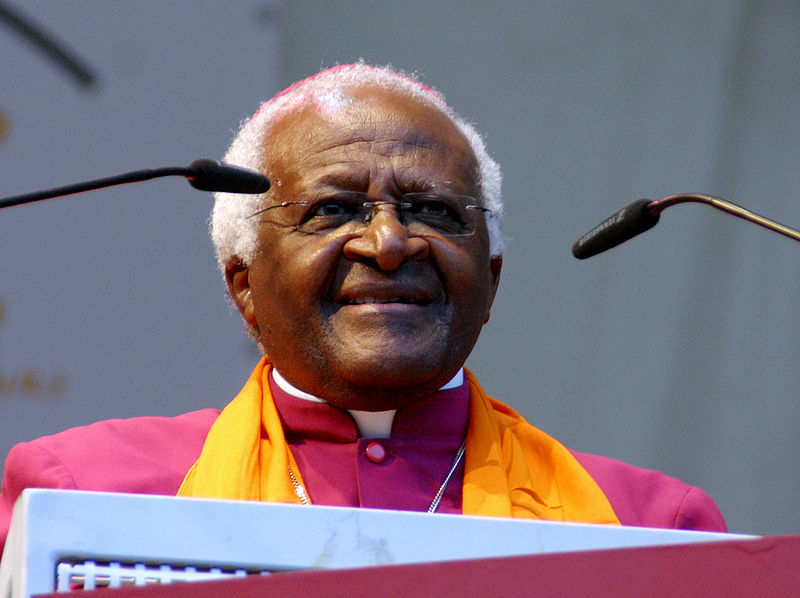Leading with Tutu: Lessons in Courage, Empathy, and Reconciliation

The Leadership Legacy of Desmond Tutu
Leadership is a complex and multifaceted concept that has fascinated scholars and practitioners for centuries. From politics to business, sports to the arts, leadership plays a critical role in shaping the world we live in. And while there are many great leaders throughout history, few can match the legacy of Desmond Tutu.
Desmond Tutu is a world-renowned leader and human rights activist who has dedicated his life to promoting justice, equality, and reconciliation. Born in 1931 in Klerksdorp, South Africa, Tutu grew up during a time of great social and political upheaval. He witnessed firsthand the injustices of the apartheid system, which institutionalized racial segregation and discrimination.
Despite these challenges, Tutu pursued a career in the church, becoming the first black Archbishop of the Anglican Church of Southern Africa in 1986. Throughout his life, Tutu has been a tireless advocate for human rights and social justice, using his platform to speak out against injustice and oppression.
Today, Tutu is recognized as one of the most important leaders of the 20th century, and his contributions to the field of leadership development are significant. In this article, we will explore the leadership lessons and stories of Desmond Tutu, and examine how his legacy can inform and inspire leaders today.
Importance of leadership lessons from Tutu
The leadership lessons of Desmond Tutu are important because they offer a powerful model for ethical and effective leadership. Tutu’s leadership style was rooted in his deep commitment to justice, equality, and reconciliation, and his approach was characterized by courage, empathy, and humility.
Moreover, Tutu’s leadership legacy has had a profound impact on the world. His work as a human rights activist and peacemaker has inspired countless individuals and organizations to pursue social justice and promote human dignity. By studying the leadership lessons of Desmond Tutu, we can learn how to become better leaders, and make a positive difference in our communities and the world at large.
The leadership lessons and stories of Desmond Tutu offer valuable insights into the nature of effective leadership, and provide a powerful model for ethical and compassionate leadership. By examining Tutu’s legacy, we can gain a deeper understanding of the principles and practices that underlie successful leadership, and learn how to apply these insights to our own lives and work.
Background on Desmond Tutu
Early life and education
Desmond Tutu was born in Klerksdorp, South Africa, in 1931. Growing up under apartheid, Tutu experienced firsthand the injustice and discrimination of the system. Despite these challenges, he excelled in his studies, earning a scholarship to study at the University of Fort Hare, where he earned a degree in education.
After graduation, Tutu worked as a teacher, and later as a social worker. In 1961, he left South Africa to study theology in England, earning a Master’s degree from King’s College, London. He then returned to South Africa to pursue a career in the church.
Career and achievements
Tutu’s career in the church began in earnest in the 1970s, when he was appointed Dean of St. Mary’s Cathedral in Johannesburg. He quickly gained a reputation as a powerful and outspoken voice for social justice and human rights, and was a leading figure in the anti-apartheid movement.
In 1984, Tutu was awarded the Nobel Peace Prize for his efforts to promote peaceful resolution of conflicts in South Africa. He continued to play a key role in the transition to democracy in the 1990s, serving as chair of the Truth and Reconciliation Commission, which investigated human rights violations during apartheid.
Throughout his career, Tutu has been a tireless advocate for human rights and social justice, speaking out against oppression, racism, and injustice wherever he has seen it. He has also been a strong voice for global peace and justice, advocating for disarmament, environmental protection, and an end to poverty and inequality.
Tutu’s leadership style and philosophy
Tutu’s leadership style was characterized by his deep commitment to justice, equality, and reconciliation. He was a firm believer in the power of compassion and empathy to bring about positive change, and he emphasized the importance of forgiveness and reconciliation as key components of social transformation.
Tutu’s approach to leadership was also marked by his courage and determination. He was not afraid to speak out against injustice, even when it was unpopular or put him at risk. And he was always willing to take a stand for what he believed in, regardless of the consequences.
In addition to these qualities, Tutu was also known for his humility and grace. He was a deeply spiritual person, and his faith was a driving force in his life and work. He saw his role as a leader not as one of power and authority, but rather as one of service and compassion.
Tutu’s leadership philosophy was grounded in the belief that all human beings are equal and deserving of respect and dignity, and that by working together, we can create a more just and peaceful world. His legacy continues to inspire leaders around the world, and his insights into leadership are as relevant today as ever.
Leadership Lessons from Desmond Tutu
Desmond Tutu’s leadership offers a powerful model for ethical and effective leadership. Throughout his life, he demonstrated key qualities and principles that can help us become better leaders. Here are some of the leadership lessons we can learn from Desmond Tutu:
Courage and Conviction
Tutu’s leadership was marked by his courage and conviction. He was not afraid to take a stand for what he believed in, even when it was unpopular or put him at risk. Tutu’s courage enabled him to speak out against injustice and oppression, and to challenge the status quo in South Africa and around the world.
As leaders, we can learn from Tutu’s example by cultivating our own courage and conviction. We must be willing to take risks and speak up for what we believe in, even when it is difficult or uncomfortable. We must be willing to challenge the status quo and fight for change, even when the odds are against us.
Humility and Empathy
Tutu’s leadership was also characterized by his humility and empathy. He saw himself as a servant of the people, and his leadership was grounded in a deep sense of compassion and concern for others. Tutu believed that empathy was key to creating a more just and peaceful world, and he emphasized the importance of understanding and respecting the experiences of others.
As leaders, we can learn from Tutu’s example by cultivating our own humility and empathy. We must be willing to listen to others and to understand their perspectives and experiences. We must be willing to put ourselves in others’ shoes and to see the world from their point of view. By doing so, we can build stronger, more compassionate relationships with those around us.
Forgiveness and Reconciliation
Perhaps the most well-known aspect of Tutu’s leadership was his emphasis on forgiveness and reconciliation. Tutu believed that these were key components of social transformation, and he played a key role in promoting these values in post-apartheid South Africa.
As leaders, we can learn from Tutu’s example by embracing forgiveness and reconciliation in our own lives and work. We must be willing to forgive others for their mistakes and to seek reconciliation in our relationships. We must be willing to acknowledge the harm we have caused others and to work towards making things right. By doing so, we can create a more compassionate and just world.
Unity and Diversity
Finally, Tutu’s leadership was marked by his commitment to unity and diversity. He believed that all human beings were equal and deserving of respect and dignity, regardless of their race, gender, religion, or any other factor. Tutu saw diversity as a strength, and he worked to build bridges between different communities and groups.
As leaders, we can learn from Tutu’s example by embracing unity and diversity in our own lives and work. We must be willing to celebrate and value differences, and to see diversity as a source of strength rather than division. We must be willing to build bridges between different communities and to promote understanding and respect for all people.
Overall, the leadership lessons of Desmond Tutu offer valuable insights into the nature of effective and ethical leadership. By embracing these principles and qualities in our own lives and work, we can become better leaders and make a positive difference in our communities and the world at large.
Tutu’s Leadership Stories
Desmond Tutu’s life and work are filled with powerful stories of leadership and social transformation. Here are some of the most notable examples:
The role of Tutu in the anti-apartheid movement
Tutu was a key figure in the anti-apartheid movement in South Africa. He played a leading role in promoting non-violent resistance to apartheid, and he was a powerful voice for change. One of Tutu’s most notable contributions to the anti-apartheid movement was his role in the Defiance Campaign of 1952. This campaign aimed to challenge unjust laws and promote civil disobedience as a means of resistance.
Tutu’s leadership in the anti-apartheid movement inspired many others to join the struggle for freedom and justice. His commitment to non-violence and his ability to unite people from different backgrounds were critical to the success of the movement.
Tutu’s reconciliation work in post-apartheid South Africa
After the end of apartheid, Tutu played a key role in promoting reconciliation and healing in South Africa. As chair of the Truth and Reconciliation Commission, Tutu oversaw the investigation of human rights abuses committed during the apartheid era. The commission aimed to promote reconciliation between victims and perpetrators of human rights violations, and to provide a forum for victims to share their stories.
Tutu’s leadership in the Truth and Reconciliation Commission was critical to its success. His compassion and empathy towards victims of human rights abuses, and his ability to listen and understand the experiences of others, helped to create an environment of trust and healing.
Tutu’s contribution to global peace and justice initiatives
Tutu’s leadership extended beyond South Africa to the global stage. He was a strong advocate for peace and justice, and he played a leading role in international initiatives aimed at promoting these values. For example, Tutu was a vocal opponent of the Iraq War, and he worked to promote disarmament and nuclear non-proliferation.
Tutu’s leadership on global issues was grounded in his deep commitment to justice and human dignity. He believed that all people, regardless of their nationality or background, were entitled to respect and compassion.
Tutu’s leadership legacy in the Anglican Church
Tutu’s leadership legacy is also evident in his work within the Anglican Church. As the first black Archbishop of the Anglican Church of Southern Africa, Tutu was a trailblazer for diversity and inclusivity in the church. He was a strong advocate for social justice and human rights, and he worked to promote greater equality and empowerment for marginalized groups.
Tutu’s leadership within the church was marked by his deep spirituality and his commitment to service. He saw his role as a leader not as one of power and authority, but rather as one of compassion and humility.
Overall, the leadership stories of Desmond Tutu demonstrate the power of ethical and compassionate leadership to bring about positive change in the world. Tutu’s leadership legacy continues to inspire and inform leaders today, and his example serves as a powerful model for those seeking to make a difference in their communities and the world at large.
Tutu’s Leadership in Practice
Desmond Tutu’s leadership lessons and stories offer valuable insights into the nature of effective and ethical leadership. But how can we apply these principles in our own lives and work? Here are some practical ways that we can implement Tutu’s leadership ideas:
Case studies of leaders who have applied Tutu’s principles
One way to learn from Tutu’s leadership is to study case studies of leaders who have successfully applied his principles. For example, Nelson Mandela, who worked closely with Tutu in the anti-apartheid movement, is often cited as an example of a leader who embodied Tutu’s values of forgiveness and reconciliation. Other leaders, such as Malala Yousafzai and Ellen Johnson Sirleaf, have also been inspired by Tutu’s leadership legacy and have applied his ideas in their own work.
Studying these case studies can provide valuable insights into how Tutu’s leadership ideas can be implemented in practice. We can learn from the successes and challenges of these leaders, and apply their lessons to our own lives and work.
Lessons learned from leaders who have implemented Tutu’s ideas
Another way to apply Tutu’s leadership ideas is to learn from the experiences of leaders who have implemented his principles in their own work. For example, the Tutu Fellows Program, an initiative of the African Leadership Institute, brings together emerging leaders from across Africa to learn from Tutu’s leadership legacy and to apply his ideas in their own leadership roles.
By participating in programs like this, leaders can gain a deeper understanding of Tutu’s leadership principles and how they can be implemented in practice. They can learn from the experiences of others, and build a network of like-minded individuals who share their commitment to ethical and effective leadership.
Practical steps for applying Tutu’s leadership lessons
Finally, there are practical steps that we can take to apply Tutu’s leadership ideas in our own lives and work. These include:
-
Cultivating our own courage and conviction: We can work to develop our own sense of courage and conviction, and to take risks and speak up for what we believe in.
-
Building empathy and understanding: We can work to cultivate empathy and understanding for others, and to seek out diverse perspectives and experiences.
-
Promoting forgiveness and reconciliation: We can work to promote forgiveness and reconciliation in our own relationships, and to seek out opportunities to promote these values in our communities and the world.
-
Celebrating diversity and promoting unity: We can work to celebrate diversity and promote unity, and to build bridges between different communities and groups.
By taking these practical steps, we can begin to apply Tutu’s leadership ideas in our own lives and work, and make a positive difference in the world around us.
The leadership lessons and stories of Desmond Tutu offer a powerful model for ethical and effective leadership. By studying Tutu’s legacy, we can learn how to become better leaders, and make a positive difference in our communities and the world at large.
Applying Tutu’s Leadership Lessons in Today’s World
Desmond Tutu’s leadership legacy is a testament to the power of ethical and effective leadership to bring about positive change in the world. Through his courage, empathy, humility, and commitment to justice and reconciliation, Tutu inspired millions of people to work towards a more just and peaceful world.
Tutu’s leadership ideas are relevant not only in the context of South Africa, but also in the global community. The principles of forgiveness, empathy, and unity can be applied in a variety of settings, from business and politics to education and healthcare.
Furthermore, Tutu’s leadership ideas are especially relevant in today’s world, where we are facing a multitude of social and environmental challenges. By cultivating a deep sense of empathy and compassion for others, we can work towards solutions that benefit all people, and not just a select few. By promoting forgiveness and reconciliation, we can build stronger, more resilient communities that are better equipped to overcome adversity.
As leaders, we have a responsibility to learn from Tutu’s leadership legacy and to apply his principles in our own lives and work. We must be willing to take risks, to challenge the status quo, and to work towards a more just and peaceful world. By doing so, we can build a better future for ourselves and for generations to come.
In conclusion, the leadership lessons and stories of Desmond Tutu offer a powerful model for ethical and effective leadership. Tutu’s legacy serves as an inspiration to leaders around the world, and his insights into leadership are as relevant today as ever. By studying Tutu’s leadership ideas and applying them in our own lives and work, we can make a positive difference in the world and create a more just and peaceful future for all.





